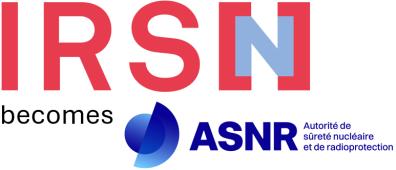Creation of the Nuclear Safety and Radiation Protection Authority (ASNR)
The Nuclear Safety and Radiation Protection Authority (ASNR) created by the law on the organisation of the governance of nuclear safety and radiation protection of 21 May 2024 came into operation on 1st January 2025. It is the result of the merger of the Autorité de sûreté nucléaire (ASN) and the Institut de radioprotection et de sûreté nucléaire (IRSN).
As an independent administrative authority, the ASNR now oversees civil nuclear activities in France on behalf of the State. It also carries out research, expert appraisal, training and public information missions in the fields of nuclear safety and radiation protection.

Chaired by Pierre-Marie Abadie, the ASNR is governed by a board of five commissioners, including the chairman. Olivier Gupta is the Director General. ANSR employs more than 2 000 people with a wide range of specific skills to protect people and the environment.
The ASNR has offices throughout France. Its head office is in Montrouge and ASNR has 11 divisions enabling it to carry out its control missions throughout metropolitan France and in the overseas departments and regions. It is also based at Fontenay-aux-Roses and Cadarache, the main sites for expertise and research in nuclear safety and radiation protection, and at Le Vésinet, the main site for environmental monitoring. It also has assessment and research centres in Cherbourg, Les Angles and Tahiti.
On an international scale, the creation of the ASNR marks France's ambition in terms of nuclear safety and radiation protection for the protection of people and the environment. ANSR will work closely with its international peers, whether they be research bodies, experts or regulatory authorities.
To find out more
ASNR press contacts
- Evangelia Petit : evangelia.petit@asn.fr ; 01 46 16 41 42
- Pascale Portes : pascale.portes@irsn.fr ; 01 58 35 70 33
Download
Launch of the 6th ICRER conference
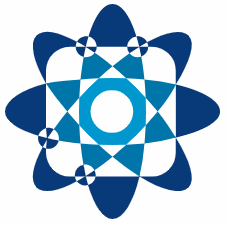
The 6th ICRER (International Conference on Radioecology & Environmental Radioactivity), jointly organized by IRSN and the Norwegian Radiation Protection and Nuclear Safety Authority (DSA), in collaboration with IUR, IAEA, UNSCEAR, EURADOS, ICRP, AER, JER and SFRP, takes place from November 24 to 29, 2024 at the Palais du Pharo in Marseille.
In addition to the traditional themes of radioecology and environmental radioactivity (assessment of the impact of radionuclides on the environment, understanding and modeling of transfer processes, development of metrology, environmental monitoring, management of materials containing radionuclides of natural origin, waste, etc.), ICRER 2024 will provide an opportunity to address emerging topics such as the use of data sciences and the impact of climate change on radionuclide transfer.
Bringing together scientists, industry players, regulators and experts, the conference will contribute to improving the knowledge, methods and tools needed to protect people and the environment from the effects of radiation.
This year, 5 speakers, invited by the organizing committee, will give plenary lectures:
- Gonéri Le Cozannet (BRGM), will present the main conclusions of the 6th report of the Intergovernmental Panel on Climate Change (IPCC).
- Hildegarde Vandenhove (IAEA), Deborah Oughton (NMBU), Georg Steinhauser (TU Wien) and Mike Wood (University of Salford) will enrich the program by sharing their perspectives on issues related to radioecology.
Other events will take place alongside the conference. Training courses will be offered, including two led by IRSN:
- “Ecosystem approaches in radioecology” by Rodolphe Gilbin
- “Radiation-induced transgenerational and multigenerational effects in human and non-human biota” by Olivier Armant.
Specific meetings will also be organized, including the “Ring of Five”, moderated by Olivier Masson (IRSN), and a meeting in partnership with the IAEA on radionuclides in marine organisms, attended by Sabine Charmasson (IRSN).
For the first time, a number of companies have sponsored the event. Among them, Algade, Agilent, Bertin Technologies, ESI, HTDS and Triskem will have a dedicated stand to present their activities and exchange with participants. The ECCOREV research federation and the SUD PACA region are also lending their support as sponsors.
Download ICRER 20224 programme
IRSN and DSO national laboratories strengthen their collaboration in nuclear safety and crisis management
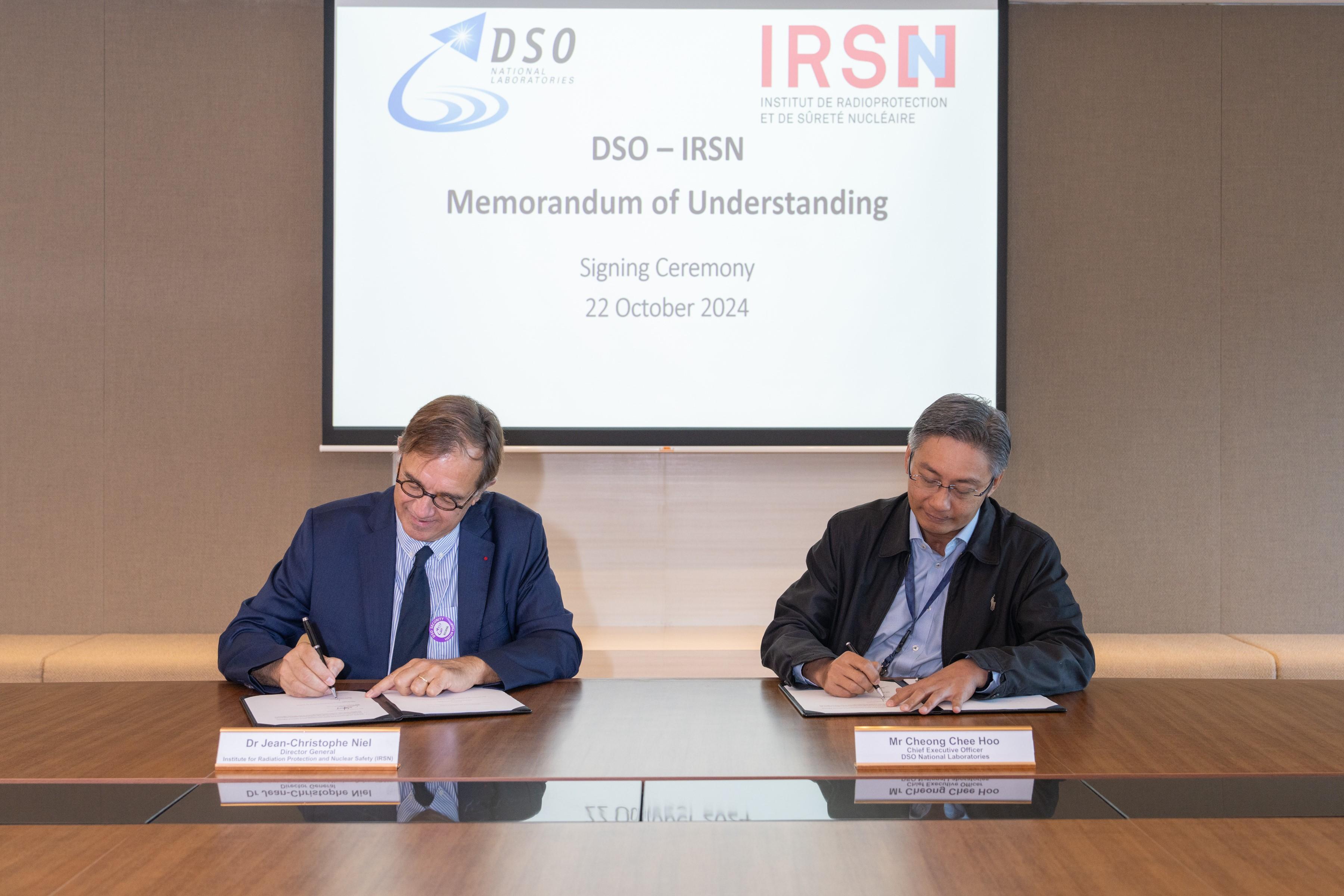
We're excited to announce that on October 22, 2024, in Singapore, Dr Jean-Christophe Niel, IRSN Director General and Mr Cheong Chee Hoo, CEO of DSO National Laboratories, signed a new Memorandum of Understanding (MoU).
This MoU builds upon our partnership that started in 2013, demonstrating both entities' commitment to advancing nuclear safety and security through collaborative research and development.
The cooperation will focus on the safety of Generation 3 reactors and on Small Modular Reactors (SMRs), as well as crisis management, inverse source term modelling based on environmental measurements, and neutron spectrometry. High-level technical exchanges and researcher exchanges (PhDs/ post-doctorates) will also play a crucial role in validating scientific data and refining calculation codes, further enhancing nuclear safety and security measures, through collaborative research.
We look forward to the innovations and advancements this strengthened collaboration will bring to the field of nuclear safety and security.
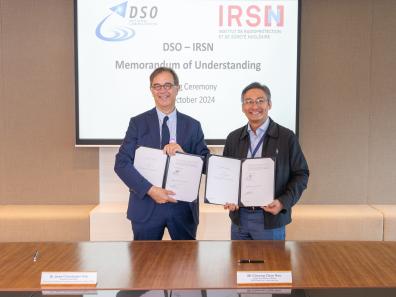

IRSN at the Singapore International Energy Week (SIEW) 2024
At the invitation of Singapore's Energy Market Authority (EMA), IRSN's Director General, Dr. Jean-Christophe Niel attended the Singapore International Energy Week (SIEW) on October 21, 23 and 24, 2024.
SIEW is an annual platform for energy professionals, decision-makers and commentators to share best practices and solutions in the global energy space.
His speeches highlighted the safety issues associated with the development of nuclear energy in Asia, promoted our scientific and technical expertise, and underlined the quality of our bilateral cooperation with the National University of Singapore.
Following a presentation by R. Grossi, DG IAEA, J-C Niel took part in the plenary session devoted to low-carbon technologies. Regarding the development of nuclear technologies, in particular SMRs, he stressed the importance of ensuring a high level of nuclear safety and managing the risks associated with these technologies. In the case of SMRs, which have characteristics favourable to nuclear safety (small size, passive safety systems), he stressed that this safety had to be demonstrated, showing the need to pursue research, develop human resources and engage in dialogue with the public. To meet these objectives, international cooperation constitutes an indispensable tool.
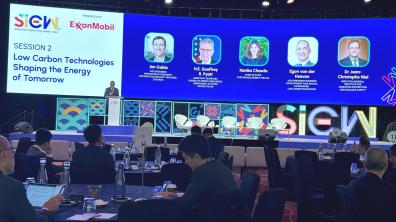
IRSN’s Director General participated also in the SIEW TechTable on October 23, dedicated to the the topic of “Ensuring Nuclear Innovation with Robust Nuclear Safety and Risk Management”. He will be able to highlight ways of supporting innovation in nuclear technologies in terms of safety, giving an insight into the role of technical safety organizations (TSOs) in supporting regulatory authorities and other stakeholders. He also stressed the importance of mobilizing science-based collective intelligence through international research collaborations, to improve the safety of nuclear installations.
On October 24, he finally intervened in the “Building Trust and Confidence in Nuclear Technology” session of the SIEW ThinkTank RoundTable, where he will share IRSN's experiences in opening up to society.
On October 24, the Director General concluded his mission to Singapore with a meeting with Mrs. Minh-Di Tang, French Ambassador to Singapore.
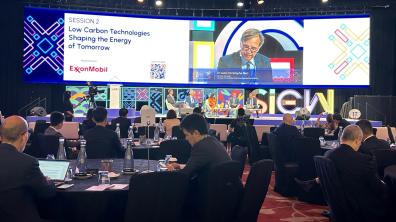
First steering committee meeting for the joint lab NUS-SNRSI/IRSN
The first steering committee meeting was held on October 22, 2024 in Singapore, in the presence of IRSN Director General Jean-Christophe Niel. The committee comprises Diane Tiong, Christelle Chua and Garvin Mak for NUS-SNRSI, and Jean-Michel Bonnet, Olivier Marchand, Marc Gleizes and Marilyne Tombette for IRSN. It will be chaired by Marc Gleizes for the first two years.
A Joint Laboratory agreement between the Singapore Nuclear Research and Safety Initiative of the National University of Singapore (NUS-SNRSI) and IRSN was signed on May 2. Under the terms of the agreement, the laboratory will be governed by a steering committee.
The joint laboratory director, Prof. Keng Yeow Chung, director of NUS-SNRSI, and its deputy director Jacqueline Garnier-Laplace, Scientific Coordinator of the European Radiation Protection Strategy of IRSN, presented an overview of activities for 2024, the work program for 2025 and the outlook for 2026 concerning the laboratory's three research themes of radiochemistry, radiobiology and safety of SMRs.
Julie-Anne Zambaux from IRSN also took the opportunity to share feedback from her 6-month secondment to NUS-SNRSI on the development of ASTEC for SMRs. Moreover, the teams regularly exchange on scientific topics of common interest, as demonstrated by IRSN's specialists Azza Habibi and Gaëtan Gruel’s remote presentations.
IRSN members of the steering committee also enjoyed a visit of the NUS-SNRSI facilities at their newly constructed building.
This meeting marks a new stage in the long-term collaboration that IRSN and NUS-SNRSI have experienced and maintained for the past 10 years.
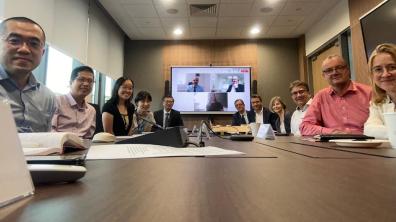
A qualification report for the CRISTAL package made available to the international community
For the first time, IRSN, in partnership with CEA, ORANO and FRAMATOME, is making validation data from the CRISTAL simulation software package available to the scientific community. This software, used by French manufacturers, makes possible carrying out neutron calculations in order to prevent a criticality accident in nuclear installations in the fuel cycle and in the transport of nuclear materials. Its validation is crucial to accurately estimate the available margins and control the criticality risk. The CRISTAL validation report presents the discrepancies between the CRISTAL results and available experiments.
CRISTAL: the French software suite for carrying out safety-criticality studies
Criticality safety calculations purpose is to study the most suitable, needed, and sufficient measures to prevent the initiating of a chain reaction when handling fissile materials in fuel cycle installations and during the transport of nuclear materials. The study of safety conditions consists of verifying, through calculation, that the restrictions imposed on the criticality control parameters make the system subcritical, in order words, that the effective multiplication factor keff remains strictly lower to 1, with sufficient safety margins.
For further information
Workshop AEN FRAME: Future Research for Accident Management Enhancement in operating and future reactors, informed by Fukushima Daiichi insights – Argonne, September 26-27, 2024
On September 26-27, 2024, IRSN’s Director General Jean-Christophe Niel participated in Argonne (Illinois - USA) in the NEA’s workshop dedicated to the “Future Research for Accident Management Enhancement in operating and future reactors, informed by Fukushima Daiichi insights”.
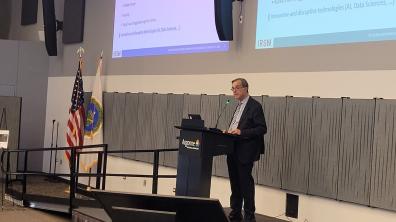
This workshop provided nuclear safety regulators, industry and research organizations with the opportunity to share their views on how the Fukushima-Daiichi accident has been used to inform accident management approaches for operating and future reactors, and on remaining potentials for their enhancement.
It will be also a forum where regulators, industry and research operating agents will share views on potentials for future collaborative research.
Jean-Christophe Niel underlined the large efforts which have been done since the Fukushima-Daichii accident to consolidate severe accident management and mitigation for French NPPs. He mentioned the strong involvement of IRSN in OECD/ NEA’s research projects, which constitute a unique platform for safety research experimentations.
He brought out also the necessity to maintain, replace or evolve existing experimental facilities, and certainly build new ones.
Finally, he mentioned that all new challenges won’t be addressed without involving the international community and all stakeholders, from regulators to operators and designers. Especially maybe the biggest one: in the coming decades, to develop skills and competencies, and train many young professionals to the nuclear field, taking into account innovative and disruptive technologies.”
